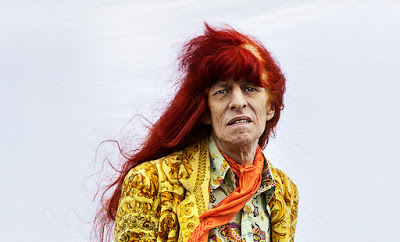David Rovics
– http://songwritersnotebook.blogspot.com/2015/11/remembering-armand.html –
Yesterday, 19 November 2015, was the 100th anniversary of the execution of labor organizer and troubadour, Joel Emanuel Hagglund, aka Joe Hill. I discovered when I woke up this morning and looked at my phone that it was also the day that my dear friend, Herman George van Loenhout, better known simply as Armand, died at the age of 69.
I had one last Joe Hill-related gig last night, one of scores of Joe Hill-related gigs I’ve done since early in 2015. I had only been in the green room behind the stage at the Alberta Rose Theater in northeast Portland when a member of the local band, General Strike, slowly entered the room. He was walking with difficulty, using a walker to stay upright. He was one of three musicians in the room who did not walk with ease anymore. Observing this fairly obvious fact, he joked in an exaggeratedly old-sounding voice, “is this the infirmary?”
Musicians often die young. It’s often a very public death. They usually keep on performing long after they should have stopped, long after they lost the ability to sing on pitch or to sustain a note, long after they couldn’t really play their instrument anymore, as they struggle with one illness or another, on and off the stage. They often keep performing not out of vanity, but out of necessity, since most musicians are poor – especially the professional ones.
As any self-aware professional musician will tell you, the most likely way for a musician to die is behind the wheel, or in a plane – Buddy Holly, John Denver, Stan Rogers. Then there are the many who die at the peak of their careers while in their twenties because the combination of the fame and the drugs and alcohol was too much for them – Janis Joplin, Jimi Hendrix, Gram Parsons, Amy Winehouse.
Many others who are not quite so inclined toward self-destruction die in their fifties due to too many years of the very exhausting combination of life on the road combined with too much drugs and alcohol over the years. I think of Jerry Garcia, and my dear friend and long-time touring partner, Alistair Hulett.
Armand died too young, but for some reason it seems relevant to point out that he didn’t drink, and his drugs of choice were of the psychedelic variety. The tobacco he mixed with his hashish did not do his lungs any favors, to be sure. But the drugs never got in the way of his spell-binding performances, except to the extent that they were part of the act.
If you look on the web you will find almost nothing in English about Armand. I would have wanted to write something about him anyway, but this fact compels me to do so that much more.
An hour ago, the English-language Wikipedia entry on Armand was just this:
“Herman George van Loenhout (born 10 April 1946 in Eindhoven, died 19 November 2015), better known as Armand, was a Dutch protest singer. He was known as ‘the Dutch Bob Dylan.’ His greatest hit song was ‘Ben ik te min’ (‘Am I not worthy?’). Armand came to the fore during the hippie generation and was an advocate of cannabis.”
Now there’s one more paragraph that has very recently been added, I just noticed. It talks of the “reviving” of his music career after 2011. Media types love to refer to things like that, but really, although he did get some major press attention in the past several years due to various artistic collaborations he was involved with, his career didn’t need reviving. He’s been a successful professional musician since the early 1960’s, and his career was doing fine before and after 2011.
I last saw him a few weeks ago in the hospital in Eindhoven, the city in the Netherlands where he lived, where he grew up. There are many people who knew him far better than I, and many, many others who know his music far better than I. There has never been an English-subtitled video made for any of his songs as far as I know. No documentaries about him with subtitles that I’ve ever found. He was an entirely Dutch phenomenon. And in the Dutch-speaking world, Armand was and is a household name, across the generations.
Armand was often caricatured, and was widely both loved and ridiculed, sometimes by the same people. He came to be the one person who more or less represented the spirit of the 1960’s in the Netherlands, so depending on where you stand in the culture wars, either you loved him, or he made you feel very uncomfortable. For many, especially for people of his generation, he was a constant reminder of something you weren’t — or had once been, but had later rejected.






